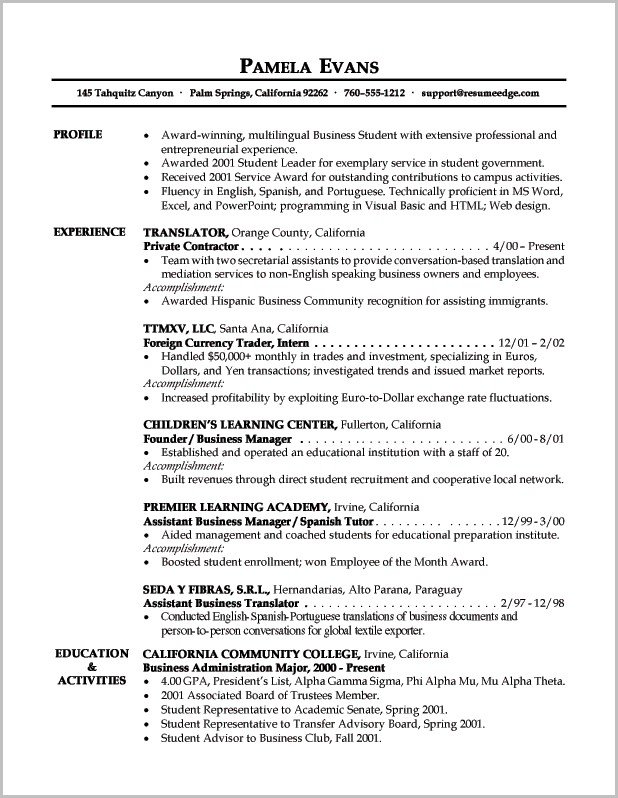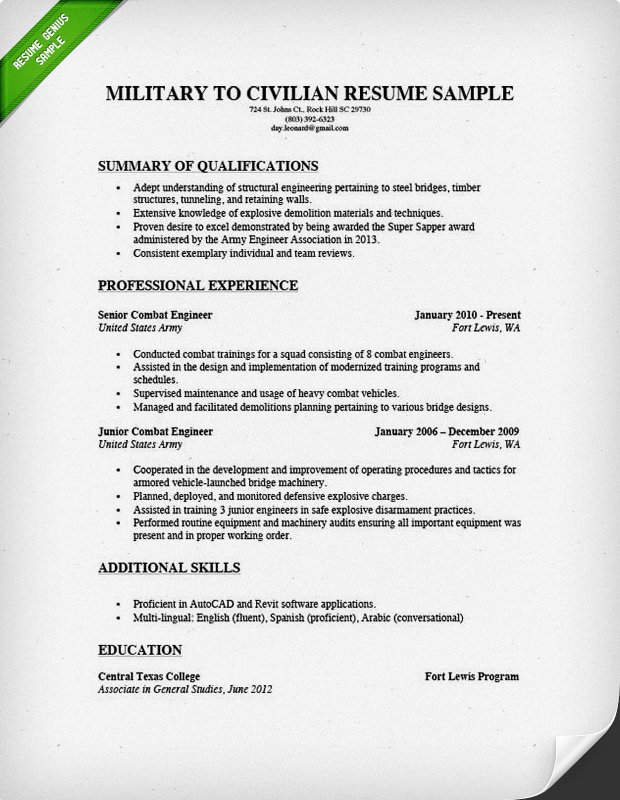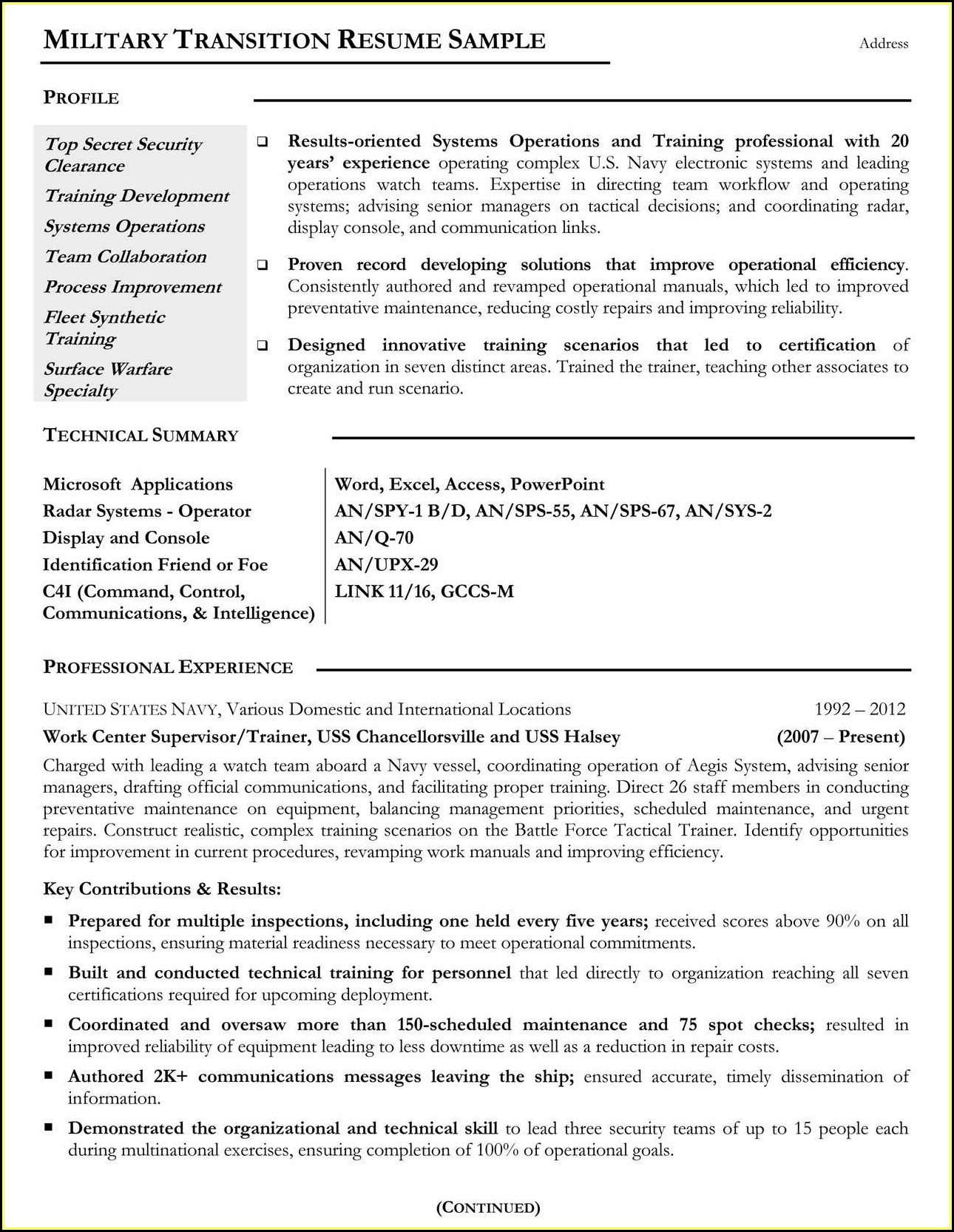Underemployment Is A Big Issue Among Vets
Before we jump into the nitty-gritty of military experience, skills, and resumes, weâd like to address an important issue. For veterans transitioning to private sector roles, underemployment is a big problem. Underemployment means not engaging in work that makes full use of your skills and abilities. Many veterans are working in positions below their skill level.
According to , though veteran unemployment has decreased over the past decade, veterans are 15.6% more likely to be underemployed than nonveterans.
This is often because veterans may find it challenging to translate their existing military skills to a civilian scenario successfully. Therefore, for military vets, the key is to think about how they can tell the story of their careers via a civilian resume.
Organize Your Thoughts And Quantify Your Experience
Second, make a list. This will save you time later when you write your résumé.
Some potential high-level skills might include such generic examples as these:
Once you have an outline of the general skills you acquired, its time to get more specific, like this:
- Senior Enlisted: 1st Sergeant, Sergeant Major,CSM, Project/Program Manager
- Civilian Skills: Supervising, managing, evaluating requirements and work productivity, training and motivating a team to perform in stressful conditions and meet deadlines, developing special programs to meet unique needs or resolve problems, setting policies and determining procedures, directing employee activities, resolving conflicts within the operation, etc.
It is also important to consider specific experiences you had that you can quantify on your résumé. This will help prospective employers get a better idea of your accomplishments and how they can apply in a civilian workplace. For example:
Use Keywords From The Job Description
As you write your resume, take note of the keywords you find in the job descriptions you apply to. You should put those keywords in your resume because they are specifically what the hiring manager is looking for. This serves a dual purpose of allowing you to use more civilian terms in your document.
You May Like: Actors Access Resume Example
Consult Your Documentation And Fitness Evaluations
There are records and resources available to all veterans that can provide a starting point or fill in some gaps.
VMET stands for Vocational and Military Employment Training, explained St. Pierre. That is a document that every single receives when they transfer out. They dont really realize that they have access to it. Its basically their military resume. It contains every MOS they were in with a description. Not only that, but every single course and certification they took.
A lot of information is available on your fitness reports or evaluations and quarterly counselings, added Cooper.
Its different in every branch of the service, continued St. Pierre. It could be a fit eval, or a fit rep. These are performance reviews. These contain such valuable information for a resume. They contain measurable results, number one. And number two, real specifics about their accomplishments, spoken from their leaders point of view.
Digging up these documents can make a world of difference when it comes to creating a strong resume foundation.
Translate Your Military Job Titles

The initial read-through of the resume is usually a quick scan. One of the areas that are often looked at first are your job titles to determine if your experience is relevant. The job titles listed on your resume must be free of military terminology and acronyms. Dont use Non-commissioned Officer in Charge, NCOIC, Chief Petty Officer or CPO when you can simply use the title of manager. Avoid using military codes or your MOS designator, such as the 11B code for Infantryman. Instead, use the title Team Leader or Crew Manager.
You May Like: How To Write A Resume Teen
When Listing Job Experience Use The Reverse Chronological Sequence
Even while prior work experience is important, the recruiter is most interested in your current work experience. The recruiter will be able to view your most relevant skills first and foremost if you have your most recent military experience available. Your cover letter is likely to have provided a decent overview of your experience, but theyll still want to know more about it before moving forward.
Include Any Relevant Education Or Training You Received
Include information about the college or university you attended regardless of the type of major you studied or the degree you earned. However, only include specialized training that is relevant to your chosen career path. Be sure to translate your military training courses so employers understand their relevance and value.
If you only received specialized training while in the military, try to relate that experience to a civilian equivalent. To do this, you could do a simple internet search and find some courses online that have similar aspects of the training you received. Use some of the descriptions of the online courses to guide you as you craft descriptions of your training.
You May Like: Graduated With Honors Resume Sample
Third List Experience With Bullet Points
The best way to list your military experience is by using bullet points and by keeping each line short while maintaining an accurate description of the duties you performed. When you list your experience, it is also important to extract keywords from job descriptions. For example, if the job you are applying for wants to hire someone who has experience with bookkeeping or budgeting, then you should add those exact keywords to your relevant experience if they are applicable.
It is also important to avoid using detailed experiences from active combat or deployment in your resume. You will need to consider how to word your experience with combat operations in a way that is relevant to the jobs you are interested in applying for. For example, you may include missions you assisted with if it includes relevant leadership skills or conflict resolution.
Translate Military Achievements To Civilian Resume
With experience and skills detailed, you will now want to detail what you have accomplished. Dont sell yourself short. As a veteran, you most likely have a great list of accomplishments in an environment that employers revere.
When identifying and building your list of accomplishments, they will need to tell how you created value. In our post, How to Include Achievements in Your Resume, we outline questions to ask to help do this. Here are a few examples:
- Did you increase efficiency? How much?
- Have you negotiated with vendors? How did it benefit the department/company?
- Did you successfully lead a project? How did it benefit the department/company?
- Have you consistently met/exceeded a target?
- Did you receive any awards for outstanding performance?
Once you have read the post and considered how to write an achievement or accomplishment, try the approach below.
Read Also: Bldzety Comresume
First Create A Separate Section Called Military Experience
It is important to list your military work experience separately from your other work experience. The goal is to create a resume that is easy for employers to read and understand. Under the main section title, you can then choose to organize your work experience with sub-sections under your job title, listed in reverse chronological order. Your most recent position in the military should be listed first and your oldest position should be at the bottom.
If you do not have other work experience, then you may simply include your military experience under a Relevant experience section.
Reach Out For A Second Or Third Opinion
After you have done this, a good test is to have a civilian friend or family member read over your list of skills and experiences and make sure that they understand what youre saying.
Have a civilian friend or family member read over your list of skills and experiences and make sure that they understand what youre saying.
Dont be afraid to ask for help! Youre going through a tough process of re-integration into the workforce and chances are there are lots of people all around you that are more than willing to offer advice on both content and formatting.
Recommended Reading: Google Spell Resume
How To Effectively Market Your Military Experience On A Resume
Lori Norris has been educating and supporting military service members to see their career options and market their military skills during their military transition since 2005. Lori considers herself bilingual she speaks military and civilian language. She is the host of the Lessons Learned for Vets Podcast, the owner of Next for Vets education services and Get Results Career Services company.
As a military-experienced job seeker, you have gained valuable experience during your service. As you prepare to make the career transition from military to civilian life, it is important to present that experience in a way that your future employer will understand. Translating your military experience into skills that will add value in the private sector workplace is critical for employers to be able to identify the value of your service to their organization. In this article, we will discuss the value of your military experience, why it is important to translate that experience and how to translate your military skills on your resume for potential employers.
You can also fill out our
-
The ability to work as part of a team
Read more: 21 Benefits of Hiring Veterans
Focus On The Right Things

When considering how your military experience translates, we always advise veterans to describe their accomplishments rather than simply outlining their previous job descriptions, Deere says.
To start, make a list of everything you accomplished during your time with the military. For example, did you earn a promotion? Help execute a new initiative? Assist with training? Then, highlight the achievements that feel most relevant to the particular job youre applying for. Being selective will also help you avoid making a mistake that Deere often sees: cramming too much onto the page. One of the most common challenges for veterans to overcome is their desire to list every single duty assignment, which very few hiring managers will take the time to read, she cautions.
Recommended Reading: How Big Should The Font Be On A Resume
Translate Any Veteran Jargon Into Civilian Terms
While you may be conversant with military acronyms, codes, and jargon, a civilian recruiter may only be aware of a handful of them. As a result, as many non-military terms as feasible should be included in your veteran CV. Once youve highlighted the important parts of your veteran service in your resume, look for any references to military terminology and replace them with simple English.
In order to translate military jargon and codes into easy language for your veteran CV, you may refer to the following examples:
- Rather than stating that you commanded other individuals, state that you supervised or directed a group of people to reach a common goal.
- Performance appraisal is a better alternative to Open Educational Resources.
- Substitute relocation for all instances of PSC.
- Rather than referring to a battalion, use the term organization.
- Use terms like conflict and dangerous circumstances to describe fighting.
- Use the terms employees,colleagues, or coworkers to refer to your subordinates.
Why Grantham University Is Committed To All Who Serve
Did you know that Grantham University was founded by a veteran for veterans? Since 1951, weve understood that education can truly transform the lives of active-duty and veteran service membersand the lives of their families.
Today, Grantham University is proud to offer educational opportunities for students in and out of the military. We serve those who serve, those who have served and the underserved. From single mothers to first-generation college students, we bring educational opportunities to those who otherwise may not have been able to pursue a college education.
And that all began by providing practical educations for post-WWII veterans. We believed then and we believe now that investing in veterans, and helping veterans invest in themselves, is good for students and good for business.
You May Like: Wpm Test For Resume
Consider A Professional Resume Rewrite
There are resume services out there to help you and guide you in developing a brand-new civilian resume and cover letter that you’ll feel confident using when applying to post-military positions. The benefit of a professional resume writer’s expertise is invaluable to the many clients they serve, so take some time and research the many products and services offered by a professional resume-writing firm some like TopResume even offer content development services for your .
Example Military To Civilian Resume
John Smith-555-5555
Experience Summary:Former military member with a high degree of technical knowledge in computer systems. Over the course of my military career, I worked on a wide range of computer systems, while demonstrating a strong ability for problem solving and leadership.
Experience:United States Army – Fort Hamilton, NYComputer Systems Specialist: 2015-2019
-
Maintained current computer systems to ensure uptime and efficiency
-
Solved problems as they arose
-
Trained fellow service members on the proper use of various computer systems
United States Army – Fort Hamilton, NYAssistant Computer Systems Analyst: 2014 – 2015
-
Assisted the Operations Analyst in day-to-day tasks
-
Completed daily checklists to ensure computer system health
-
Reviewed incident reports to find the cause of problems and design solutions
-
Helped develop a system that tracked readiness among recruits
United States Army – Fort Hamilton, NYPlatoon Leader: 2012-2014
-
Provided individual instruction and training to a platoon of 40 people
-
Ensured team and equipment readiness on a daily basis
-
Developed a training program that led to a 100% certification rate among team members
-
Helped new recruits transition into military life
Education:New Jersey Institute of Technology, Newark NJ, 2008Bachelor of Science in Computer Science and Information Technology
Additional Skills:
Recommended Reading: Is The Corvette Factory Open
Why It Is Important To Translate Your Military Skills On Your Resume
No matter how impressive your military experience and accomplishments may be, if the potential employer doesnt understand your terminology or how it is relevant to the job you are pursuing, your resume will not go very far. You must translate your military skills and relate your military experience to your next career. Incorporate your military experience throughout your resume using the same format as work experience, with the most recent positions listed first.
Here are some key strategies to translating your military experience:
Translate Terms Into Civilian Language
Some positions, such as those in combat, can be harder to quantify. In those cases, its important to put the job into terms that any lay person could understand. For example, if you were responsible for property and equipment, you might say, proactively maintained and repaired six vital IOT-enabled pieces of equipment, ensuring operational efficiency for 300+ team members. Or if you worked under stressful conditions, you could say cultivated strong attention to detail under stressful conditions, successfully completing 23 initiatives while juggling multiple competing priorities.
If you can translate your actual job titles into civilian terms, its worth including both on your resume. This can work well in some cases, like Team Lead instead of Squad Leader, or Operations Manager instead of Operations NCO, says Deere. Heres what it might look like:
Squad Leader | United States Air Force | May 2013 – July 2019
Lastly, dont forget that the military has a language all its own and most civilians wont understand the acronyms and jargon. So, do your best to simplify or translate whenever possible. A tank might be an operational vehicle or a piece of equipment, a mission might be better described as an initiative or project, and reconnaissance might be data collection or research.
Read Also: How To Make Indeed Resume
Make Your Resume Unique To You
Youve got the basics down. Now use your resume to showcase your unique abilities and accomplishments.
- Target your resume. Change and tailor your resume for the job youre targeting. Learn what this employer looks for and highlight those qualities.
- Translate everything into civilian terms.
- For example, replace officer in charge with managed.
- Take out the acronyms and use terms civilians understand. For example, replace SNOIC for 2d MarDiv G-3, planning and executing all logistics for operations conducted in our AOR. with Supervised staff of 15 people. Planned and coordinated operations conducted by various subordinate units within our division.
Add Your Military Education To Your Resume

Military academies and schools are highly regarded in the U.S. as being top-tier educational institutions. If youve graduated from a military academy, take credit for your hard work by listing your education in your resume education section.
Treat your military education the same as any education acquired at a public or private U.S. institution. List dates of study, degree achieved, and any achievements or honors you gained.
Heres an example of a veterans military education experience from West Point:
UNITED STATES MILITARY ACADEMY | WEST POINT, NY 2010 2014
Bachelor of Science, Law and Legal Studies
- Graduated with a 3.9/4.0 GPA
- Deans List 4 semesters
- Superintendents Award for Excellence recipient
Also Check: How Small Can Resume Font Be